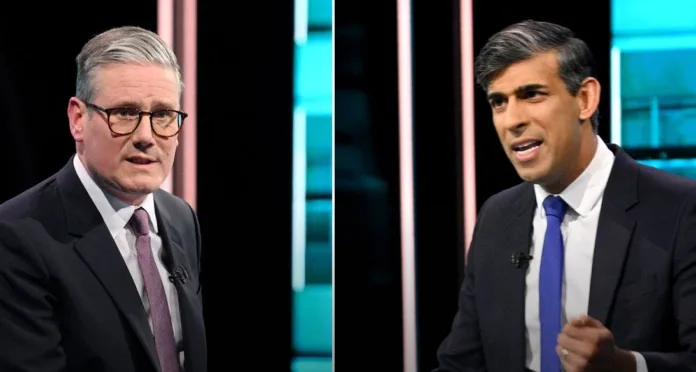The Office for Statistics Regulation rebukes Rishi Sunak for unclear and misleading tax claims during a TV debate
The UK’s statistics watchdog has issued a warning to the Conservative Party over Prime Minister Rishi Sunak‘s claim that Labour would impose a £2,000 tax rise, criticizing the lack of clarity in the calculations. During a leadership debate on ITV, Sunak stated that “independent Treasury officials” had costed Labour’s policies and concluded they would result in a £2,000 tax increase for everyone.
The Office for Statistics Regulation (OSR) expressed concern that the claim was misleading, as it was unclear the figure referred to a four-year period. Additionally, the OSR highlighted that some of the data used in the calculation were derived from sources outside the Treasury, contradicting Sunak’s assertion that it was independently calculated by Treasury officials.
The OSR emphasized the importance of transparency in presenting tax and spending policies, urging all political parties to provide the public with a clear understanding of their financial claims. The watchdog stated that without reading the full Conservative party costing document, the public would be unaware that the £2,000 figure was an estimate summed over four years. This practice, they warned, risks misinterpretation and undermines trust in political claims and statistics.
Sir Robert Chote, chair of the UK Statistics Authority, underscored the need for politicians to use statistics transparently, especially in the lead-up to an election. Speaking on BBC Radio 4’s Today programme, Chote advised that high-profile numerical claims should be clearly defined, sourced, and explained to ensure public understanding. He criticized Sunak’s implication that the Treasury had fully endorsed the claim, noting that the Treasury permanent secretary had denied this.
The Labour Party’s campaign coordinator, Pat McFadden, responded to the OSR’s statement by criticizing the Conservatives’ claim as “ludicrous.” The Conservative Party has been approached for comment but has yet to respond.
Analysis:
Political Impact: The OSR’s rebuke of Rishi Sunak’s tax claim could have significant political repercussions. As the UK approaches an election, the integrity and transparency of political claims are under intense scrutiny. Sunak’s misleading statement could damage the Conservative Party’s credibility and provide Labour with a potent talking point to criticize the government’s honesty and accountability. This incident underscores the critical role of regulatory bodies in maintaining fair political discourse and could influence future campaign strategies.
Social Reflection: The controversy over Sunak’s tax claim reflects broader societal concerns about trust in political leaders and the information they provide. In an era where misinformation can spread rapidly, the public increasingly demands transparency and accuracy from those in power. The OSR’s intervention highlights the importance of watchdog organizations in holding politicians accountable and ensuring that the electorate is well-informed.
Psychological Aspect: Misleading political claims can have psychological effects on the electorate, fostering cynicism and disengagement from the political process. When leaders make exaggerated or false statements, it can erode public trust and create a sense of disillusionment. Ensuring that political discourse is based on accurate and transparent information is crucial for maintaining a healthy democratic society.
Sociological Angle: The use of misleading statistics in political campaigns can deepen societal divides and contribute to polarization. When political figures manipulate data to serve their narratives, it can create confusion and distrust among voters. This incident with Sunak’s tax claim illustrates the need for a more informed and critical electorate that can discern between factual information and political spin.
Fashion Culture: Although the issue at hand does not directly impact fashion culture, it indirectly highlights the role of media and public perception in shaping opinions and trends. Just as transparency and authenticity are valued in political discourse, they are also increasingly important in the fashion industry, where consumers demand honest and ethical practices from brands
